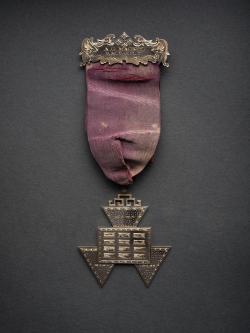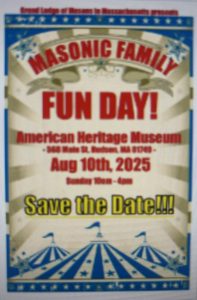Thank you to the staff of the Scottish Rite Museum and Library for their continued great work. In addition to writing articles on pieces, they have been hard at work switching both the library and archive online catalogs over to new platforms, so be on the lookout next spring for the completion of the projects!
On February 12, 1867, Dr. Albert Gallatin Mackey addressed his brethren at the Annual Grand Convention of the Most Excellent Grand Chapter of Royal Arch Masons of South Carolina in Charleston. Mackey (1807-1881) was the presiding officer, or Grand High Priest, of the Grand Chapter. In his remarks, Mackey let his fellow Royal Arch Masons know that “for the first time in twenty years” he would not be there for the entire meeting due to “imperative and unexpected calls of public business.” Mackey continued, lamenting the beleaguered state of Royal Arch Freemasonry in South Carolina, noting that “strife in our land pressed heavily on the condition of our Chapters.” Most chapters in South Carolina had stopped work during the Civil War. In 1867, when Mackey offered these comments, several remained closed. Representatives from fourteen chapters attended the 1867 gathering.
In his remarks, Mackey reviewed his long association with Royal Arch Masonry in South Carolina, recalling that in 1847, when he first served as Deputy Grand High Priest, the state claimed only two functioning chapters. By 1860 Mackey had helped establish twenty-two chapters. He recalled that he had spent time at each of the chapters to “instruct them in the work.” Mackey summed up his long involvement with Royal Arch Masonry in South Carolina stating that he could, “without arrogance, claim that the present organization of Royal Arch Masonry in the State, has been produced by my personal labor and teaching.”
The next day, to acknowledge Mackey’s significant contributions to Royal Arch Freemasonry in South Carolina, a group recommended that a committee be appointed and charged to “show some, though inadequate, evidence of the high appreciation of Comp. Mackey’s services to Royal Arch Masonry” and to “prepare a Jewel or other suitable memento” to present to Mackey “as the funds of the Grand Chapter will admit.”
Several years passed before the Grand Chapter could afford to commission Mackey’s jewel. In 1875, the project moved forward with a $50 appropriation combined with $30 contributed by five chapters to procure jewels for Mackey and another past Grand High Priest. From an expense recorded in the Grand Treasurer’s report for the year, it appears the two jewels together cost $100. Mackey’s jewel was recently donated to the Scottish Rite Masonic Museum & Library.
Charleston silversmith, jeweler, and fellow Mason, Joseph Bock (1837-1903), crafted Mackey’s handsome jewel in gold over silver in the shape of a high priest’s breast plate floating over three joined triangles, all symbols related to the office of High Priest. The jewel bears his maker’s mark, “Jos. Bock” stamped on the back. Bock, a member of La Candeur Lodge No. 36 in Charleston, advertised “Masonic Jewels in sets or singly furnished to order” in 1867. Newspaper notices in the late 1860s and early 1870s complimented the “artistically wrought” and “handsome” jewels crafted in “exquisite style” that Bock, often working with engraver William Fisher, created for the Masonic community.
Upon receiving the jewel at his home in Washington D. C., in 1875, Mackey wrote to thank the Grand Chapter. In his letter, Mackey spoke of the “very close and warm place in my heart” held by the chapters and members of the Grand Chapter. He also stated that he would wear “this token of brotherly love, coming from the cherished companions of my dear native State” with gladness and pride. Mackey is primarily remembered today for his books about Freemasonry including A Lexicon of Freemasonry (1845), The History of Freemasonry in South Carolina (1861), and An Encyclopedia of Freemasonry and its Kindred Sciences…(1873). This jewel is a tangible reminder of the time he spent solidifying Royal Arch Freemasonry in South Carolina and of the regard he earned from his fellow Freemasons in this endeavor.
Haven’t gotten enough “From the Archives”? Click the link below to see more articles!






